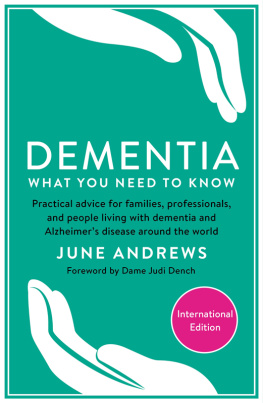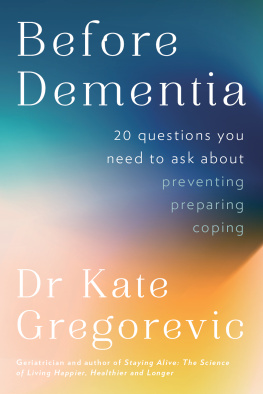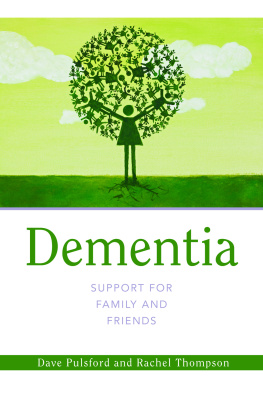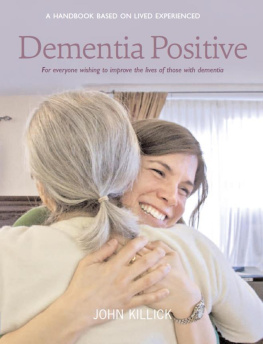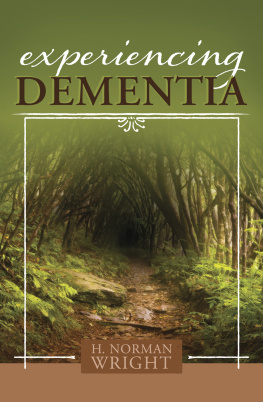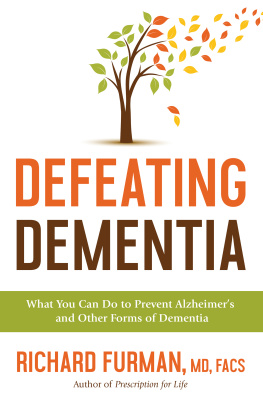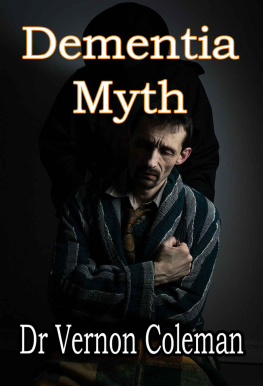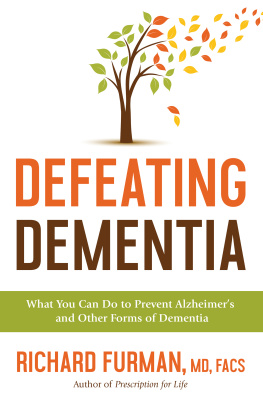June Andrews - Dementia
Here you can read online June Andrews - Dementia full text of the book (entire story) in english for free. Download pdf and epub, get meaning, cover and reviews about this ebook. year: 2020, publisher: Profile, genre: Home and family. Description of the work, (preface) as well as reviews are available. Best literature library LitArk.com created for fans of good reading and offers a wide selection of genres:
Romance novel
Science fiction
Adventure
Detective
Science
History
Home and family
Prose
Art
Politics
Computer
Non-fiction
Religion
Business
Children
Humor
Choose a favorite category and find really read worthwhile books. Enjoy immersion in the world of imagination, feel the emotions of the characters or learn something new for yourself, make an fascinating discovery.

- Book:Dementia
- Author:
- Publisher:Profile
- Genre:
- Year:2020
- Rating:4 / 5
- Favourites:Add to favourites
- Your mark:
- 80
- 1
- 2
- 3
- 4
- 5
Dementia: summary, description and annotation
We offer to read an annotation, description, summary or preface (depends on what the author of the book "Dementia" wrote himself). If you haven't found the necessary information about the book — write in the comments, we will try to find it.
Dementia — read online for free the complete book (whole text) full work
Below is the text of the book, divided by pages. System saving the place of the last page read, allows you to conveniently read the book "Dementia" online for free, without having to search again every time where you left off. Put a bookmark, and you can go to the page where you finished reading at any time.
Font size:
Interval:
Bookmark:
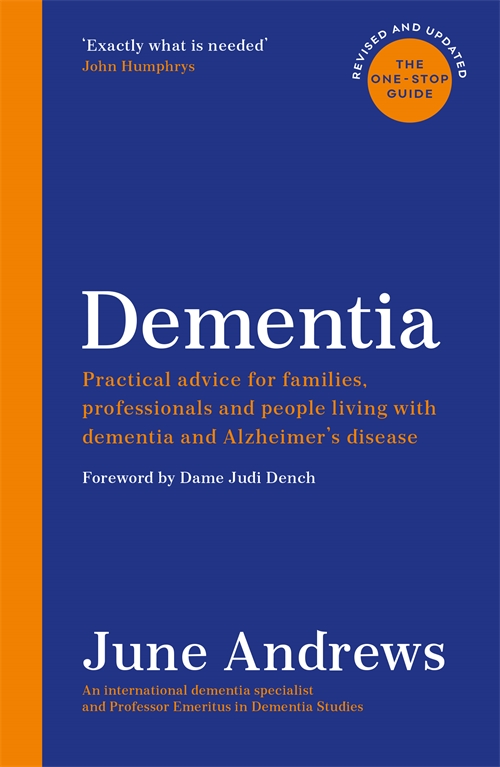
Dementia
THE ONE - STOP GUIDE
June Andrews is an international dementia specialist adviser, and Professor Emeritus in Dementia Studies. During her decade directing the University of Stirlings Dementia Services Development Centre, she co-wrote 10 Helpful Hints for Carers, a book on helping care for those with dementia, which has sold over 65,000 copies. She has received a Fellowship of the Royal College of Nursing (RCN), the highest honour awarded to nurses in the UK, and in 2016 she was awarded an OBE. She advises families, organisations and governments across the world. She is also author of Care Homes: The One-Stop Guide.
Follow @profjuneandrews on Twitter
ALSO BY JUNE ANDREWS
Care Homes: The One-Stop Guide
(Souvenir Press, 2020)
10 Helpful Hints for Carers
(with Allan House, University of Stirling, 2009)
When Someone You Know Has Dementia
(Greystone Books, 2016)
Dementia: What You Need to Know
(Profile Books, International Edition, 2016)
Demencja: Kompleksowy przewodnik po chorobie
(Harmonia Universalis, 2015)
REVISED AND UPDATED
THE ONE - STOP GUIDE
Practical advice for families, professionals and people living with dementia and Alzheimers disease
June Andrews

This revised edition published in 2020 by Souvenir Press
First published in Great Britain in 2015 by
Profile Books Ltd
29 Cloth Fair
London
EC1A 7JQ
www.profilebooks.co.uk
Copyright June Andrews, 2015, 2020
10 9 8 7 6 5 4 3 2 1
Typeset in Dante by MacGuru Ltd
Printed and bound in Great Britain by
CPI Group (UK) Ltd, Croydon, CR0 4YY
The moral right of the author has been asserted.
All rights reserved. Without limiting the rights under copyright reserved above, no part of this publication may be reproduced, stored or introduced into a retrieval system, or transmitted, in any form or by any means (electronic, mechanical, photocopying, recording or otherwise), without the prior written permission of both the copyright owner and the publisher of this book.
A CIP catalogue record for this book is available from the British Library.
ISBN 978 1 78816 505 1
eISBN 978 1 78283 694 0

Dedicated to my sister, Hazel McKay
Dear Reader
I knew nothing really of dementia before working on the film biography of Iris Murdoch. I was delighted to have played the part of Iris and learned a great deal about this condition from others working on the project who had direct experience of Alzheimers disease. Im very, very pleased that if the film did anything, it put this illness in the spotlight for perhaps the first time. In the years after I undertook this role, I watched the dementia work of the Iris Murdoch Centre, which was funded by the Dementia Services Development Trust at the University of Stirling, and I have become an ambassador for those who help people with Alzheimers disease, doing what I can to support them in raising awareness.
Dementia: The One-Stop Guide became an instant best-seller in the UK because it is so clear and practical, and I commend this second edition to you, which has been updated based on the feedback from people affected by dementia and their carers.
It was very daunting playing the role of a woman with dementia for a film, but no comparison to those who suffer with dementia or those who care for them. I hope this book will help families and friends of people with dementia, and be a support to those professionals who work to improve their difficult journey.
With love and good wishes,
Judi Dench

This is an update of a really useful book all about dementia and what happens when someone is affected by it. The word dementia is used to describe the collection of warning signs that show up when your brain stops working as well as it used to. It is defined as dementia only if these signs continue to get worse, with a permanent deterioration over time. If you know about dementia you will be better able to look after yourself or someone in your family who is affected by it.
Interest in dementia in the media has never been so great. Films have been made about famous people who had dementia. Iris, starring Dame Judi Dench, tells the true story of the English novelist Iris Murdoch from her brilliant youth to her last days in a care home. The Iron Lady is a moving film which explores Margaret Thatchers life through fragments of history that represent her disintegrating thinking and recollection clouded by dementia (and some rather impressive hallucinations). Movies also explore ethical issues of caring. Away from Her and The Savages describe the caring dilemmas of a husband in one case and children in the other. Still Alice is about the rare inherited form of dementia. Although there is still stigma, this public airing means that people are more open about dementia and allow themselves to think about it more than they did in the past. This is all good.
Public figures affected by dementia in their families are recruited as champions by dementia charities and encouraged to talk publicly about dementia and share their stories with other people. Often when I get into a taxi and the driver asks me what I do, I hear a personal story about how dementia has affected their family. Once upon a time it was a shameful secret.
Nevertheless, it is still almost impossible to get sensible advice about dementia. We are faced with waves of publicity on the subject as newspapers print misleading headlines implying that there will be miracle cures available almost immediately. Families affected by dementia live in fear of losing their entire lifes savings in care-home fees. Television adverts encourage us to be positive about dementia while at the same time celebrities and thought leaders say that theyd rather have cancer, or that they believe theyd have a duty to kill themselves if they had dementia. Investigative reporters make TV shows out of the misery of vulnerable people who have been on the receiving end of bad care. Scandalous nursing-home stories ruin our confidence that there might be a nursing home anywhere in which residents, even if they deteriorate, have the benefit of comfort and good cheer. The often-reported heartbreaking treatment of patients with dementia in hospital makes us afraid for ourselves and our older relatives.
In the middle of all this, thousands of people every year get the shocking news that someone in their family has dementia. For many of them their experience unfolds as if no one has ever travelled this path before. They are in uncharted territory, often surrounded by health and social care workers who dont know a huge amount about the condition. For many people it is hard to know where to turn for sensible advice.
How do I know this? In 2011, with Professor Allan House, a liaison psychiatrist, I wrote a book in plain language called
Font size:
Interval:
Bookmark:
Similar books «Dementia»
Look at similar books to Dementia. We have selected literature similar in name and meaning in the hope of providing readers with more options to find new, interesting, not yet read works.
Discussion, reviews of the book Dementia and just readers' own opinions. Leave your comments, write what you think about the work, its meaning or the main characters. Specify what exactly you liked and what you didn't like, and why you think so.

